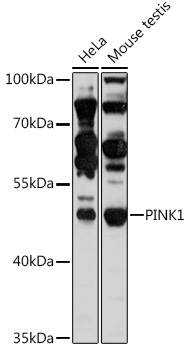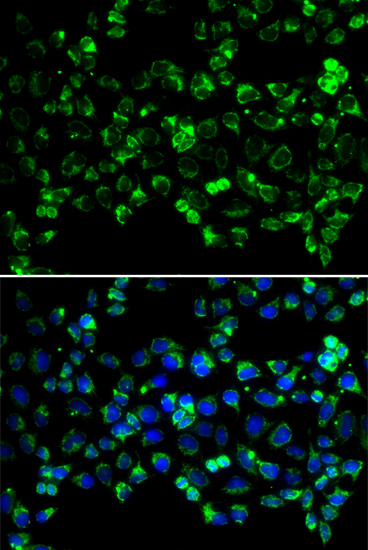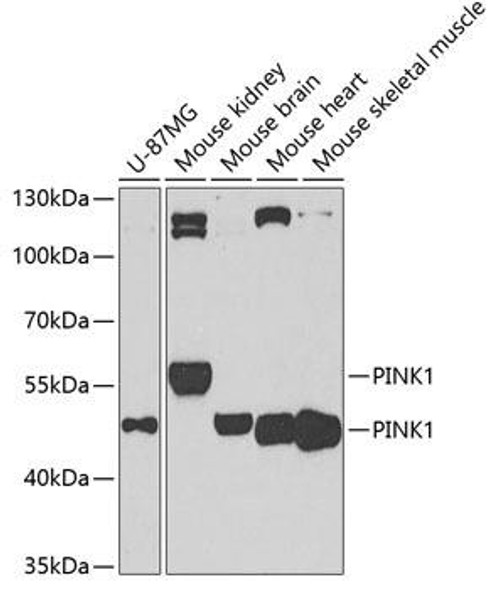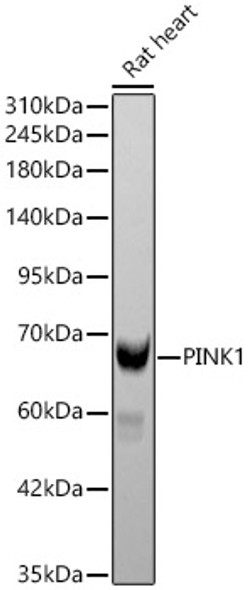Autophagy Antibodies
Anti-PINK1 Antibody (CAB11435)
- SKU:
- CAB11435
- Product Type:
- Antibody
- Reactivity:
- Human
- Reactivity:
- Mouse
- Reactivity:
- Rat
- Host Species:
- Rabbit
- Isotype:
- IgG
- Antibody Type:
- Polyclonal Antibody
- Research Area:
- Autophagy
Description
| Antibody Name: | Anti-PINK1 Antibody |
| Antibody SKU: | CAB11435 |
| Antibody Size: | 20uL, 50uL, 100uL |
| Application: | WB IF |
| Reactivity: | Human, Mouse, Rat |
| Host Species: | Rabbit |
| Immunogen: | Recombinant fusion protein containing a sequence corresponding to amino acids 282-581 of human PINK1 (NP_115785.1). |
| Application: | WB IF |
| Recommended Dilution: | WB 1:500 - 1:2000 IF 1:50 - 1:200 |
| Reactivity: | Human, Mouse, Rat |
| Positive Samples: | HeLa, Mouse testis |
| Immunogen: | Recombinant fusion protein containing a sequence corresponding to amino acids 282-581 of human PINK1 (NP_115785.1). |
| Purification Method: | Affinity purification |
| Storage Buffer: | Store at -20'C. Avoid freeze / thaw cycles. Buffer: PBS with 0.02% sodium azide, 50% glycerol, pH7.3. |
| Isotype: | IgG |
| Sequence: | TSSV PLLP GALV DYPD VLPS RLHP EGLG HGRT LFLV MKNY PCTL RQYL CVNT PSPR LAAM MLLQ LLEG VDHL VQQG IAHR DLKS DNIL VELD PDGC PWLV IADF GCCL ADES IGLQ LPFS SWYV DRGG NGCL MAPE VSTA RPGP RAVI DYSK ADAW AVGA IAYE IFGL VNPF YGQG KAHL ESRS YQEA QLPA LPES VPPD VRQL VRAL LQRE ASKR PSAR VAAN VLHL SLWG EHIL ALKN LKLD KMVG WLLQ QSAA TLLA NRLT EKCC VETK MKML FLAN LECE TLCQ AALL LCSW RAAL |
| Gene ID: | 65018 |
| Uniprot: | Q9BXM7 |
| Cellular Location: | Cytoplasm, Mitochondrion outer membrane, Single-pass membrane protein, cytosol |
| Calculated MW: | 30kDa/62kDa |
| Observed MW: | 50kDa |
| Synonyms: | PINK1, BRPK, PARK6 |
| Background: | This gene encodes a serine/threonine protein kinase that localizes to mitochondria. It is thought to protect cells from stress-induced mitochondrial dysfunction. Mutations in this gene cause one form of autosomal recessive early-onset Parkinson disease. |
| UniProt Protein Function: | PINK1: Protects against mitochondrial dysfunction during cellular stress, potentially by phosphorylating mitochondrial proteins. Involved in the clearance of damaged mitochondria via selective autophagy (mitophagy). It is necessary for PARK2 recruitment to dysfunctional mitochondria to initiate their degradation. Interats with PARK2. Highly expressed in heart, skeletal muscle and testis, and at lower levels in brain, placenta, liver, kidney, pancreas, prostate, ovary and small intestine. Present in the embryonic testis from an early stage of development. Belongs to the protein kinase superfamily. Ser/Thr protein kinase family. 2 isoforms of the human protein are produced by alternative splicing. |
| UniProt Protein Details: | Protein type:Membrane protein, integral; Protein kinase, Other; Kinase, protein; Mitochondrial; EC 2.7.11.1; Protein kinase, Ser/Thr (non-receptor); Other group; NKF2 family Chromosomal Location of Human Ortholog: 1p36 Cellular Component: mitochondrion; mitochondrial intermembrane space; cytosol; mitochondrial outer membrane; cytoskeleton; membrane; axon; perinuclear region of cytoplasm; mitochondrial inner membrane; cytoplasm; TORC2 complex; chromatin; nucleus; integral to mitochondrial outer membrane Molecular Function:protein kinase B binding; protein serine/threonine kinase activity; protein binding; protease activator activity; protease binding; ubiquitin protein ligase binding; magnesium ion binding; kinase activity; ATP binding Biological Process: ubiquitin-dependent protein catabolic process; negative regulation of JNK cascade; positive regulation of dopamine secretion; positive regulation of translation; regulation of protein ubiquitination; protein ubiquitination; protein amino acid phosphorylation; positive regulation of protein amino acid dephosphorylation; negative regulation of macroautophagy; regulation of mitochondrial membrane potential; positive regulation of ubiquitin-protein ligase activity; regulation of protein complex assembly; response to stress; negative regulation of neuron apoptosis; regulation of hydrogen peroxide metabolic process; mitochondrion organization and biogenesis; positive regulation of I-kappaB kinase/NF-kappaB cascade; protein stabilization; activation of protein kinase B; positive regulation of synaptic transmission, dopaminergic; positive regulation of peptidyl-serine phosphorylation; positive regulation of protein kinase B signaling cascade; peptidyl-serine phosphorylation; mitochondrion degradation; positive regulation of transcription factor activity; response to oxidative stress; positive regulation of protein amino acid phosphorylation; phosphorylation Disease: Parkinson Disease 6, Autosomal Recessive Early-onset |
| NCBI Summary: | This gene encodes a serine/threonine protein kinase that localizes to mitochondria. It is thought to protect cells from stress-induced mitochondrial dysfunction. Mutations in this gene cause one form of autosomal recessive early-onset Parkinson disease. [provided by RefSeq, Jul 2008] |
| UniProt Code: | Q9BXM7 |
| NCBI GenInfo Identifier: | 14165272 |
| NCBI Gene ID: | 65018 |
| NCBI Accession: | NP_115785.1 |
| UniProt Secondary Accession: | Q9BXM7,Q8N6T9, Q8NBU3, Q96DE4, |
| UniProt Related Accession: | Q9BXM7 |
| Molecular Weight: | |
| NCBI Full Name: | serine/threonine-protein kinase PINK1, mitochondrial |
| NCBI Synonym Full Names: | PTEN induced putative kinase 1 |
| NCBI Official Symbol: | PINK1 |
| NCBI Official Synonym Symbols: | BRPK; PARK6 |
| NCBI Protein Information: | serine/threonine-protein kinase PINK1, mitochondrial; protein kinase BRPK; PTEN-induced putative kinase protein 1 |
| UniProt Protein Name: | Serine/threonine-protein kinase PINK1, mitochondrial |
| UniProt Synonym Protein Names: | BRPK; PTEN-induced putative kinase protein 1 |
| Protein Family: | Serine/threonine-protein kinase |
| UniProt Gene Name: | PINK1 |
| UniProt Entry Name: | PINK1_HUMAN |








